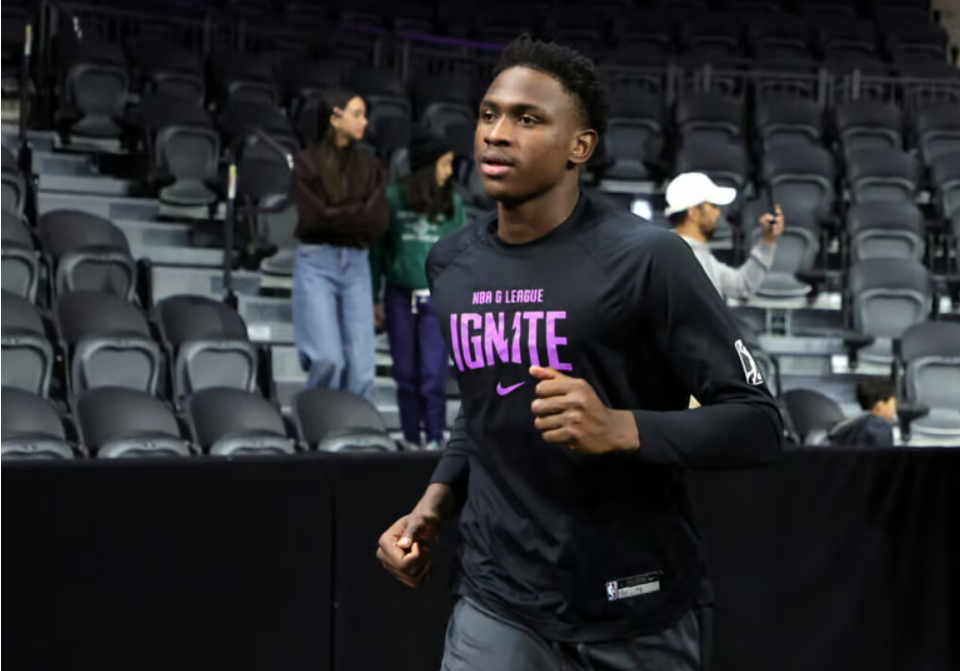Basketball Africa League continues to grow the game, develop continental talent

Photo of Babacar Sane with the G League Ignite: Ethan Miller
The NBA’s entry into Africa will hit another milestone this weekend when the Basketball Africa League kicks off for its third season. Launched in the middle of a pandemic, the league is slowly emerging into what the NBA hopes will create growth for years to come.
The BAL is at the heart of the NBA’s multi-pronged plan. Through the BAL and NBA Africa, the NBA is hoping to develop a basketball ecosystem that will one day make the sport more popular and also create a pipeline of talent.
“If we think about growing the game of basketball in Africa an important element in that is ensuring that young people who are interested in the game, and want to invest in developing their skills, they need to see a pathway where there is a future for them in playing basketball at a really high level on the continent,” Victor Williams, the NBA Africa CEO, said. “The BAL ultimately sits at the top of our development, our basketball pyramid on the continent. It should become, and it’s our intention that it become something that African youth aspire to from the time they are in our junior NBA program and proceeding through clinics and camps and academies.”
The league operates with 12 teams, drawn from Africa’s various professional leagues. The champions in Angola, Egypt, Nigeria, Rwanda, Senegal and Tunisia earn spots, while six other teams enter through a qualifying tournament. Each roster must have at least eight players who are citizens of that team’s country and no more than two players who are from outside of Africa. Each team also has one player from the NBA Academy. This season eight former G League players, and known names like Zaire Wade, will play in the Sahara Conference with the rosters for the Nile Conference still to come.
While the first season was played in one city in a bubble, the BAL has since moved to its original travel model, the BAL has since moved to its original travel model, shifting between cities in Senegal, Egypt and Rwanda. This weekend, games will kick off in Dakar.
The NBA is hoping that the BAL can serve as something young players across the continent strive for and shows high-level basketball is attainable near home. It also is trying to use it as a way to bring a piece of the NBA abroad. Deputy commissioner Mark Tatum said that a BAL game presentation hews closely to an NBA game.
#BALAdvance is the league’s development platform for players, coaches, and future staff 🙌
Today marked our first day of player programs, focusing on Mental Performance 🧠 and Nutrition 🥑 pic.twitter.com/xy2Bf0rTF1— Basketball Africa League (@theBAL) March 10, 2023
The NBA is using it to bring more of its content worldwide. The BAL will be broadcast in 214 countries and territories, the league said, and in 17 languages. All games will be on its NBA app. The BAL derives “some revenue” from its media rights “but at this point really our focus is ensuring we’re having reach. We want people to be aware of the product,” Williams said. Games will be available in China, across Africa, and on the radio on Voice of America.
The BAL is part of what the NBA sees as one of the first steps in its investment in Africa, something it hopes can pay off in multiple ways years down the line.
Right now, roughly one-quarter of the league is made up of international players, and about 50 were born in Africa or have a parent born there, Tatum said. The NBA hopes to drive more interest in the sport, which then brings more coaching and investment and opportunities for children who want to play.
They have already seen some progress. Babacar Sane played in the BAL last season as part of the Academy program and signed with the G League Ignite this season; three others went on to join college basketball programs.
“We’ve got that level of presence of African players or players of African descent playing in our league with no infrastructure,” Tatum said. “Once we build that infrastructure, and people start investing in that infrastructure to create these pathways, we think that that number is going to continue to grow and grow and grow significantly.”
The NBA also foresees a new sports economy emerging across Africa and wants to be in the middle of it. Tatum said he has already seen that there is an industry popping up.
He points to a new 20,000-seat arena built in Dakar, a new arena in Kigali, Rwanda, and projects underway in other countries.
“We actually see an opportunity to use sports, but specifically basketball, as a driver of economic growth on the continent,” he said. “I would say historically in Africa, sports is just that. It’s sports, it’s a competition. It’s not necessarily viewed as a business. But because you got this continent with over a billion people. A young, fast-growing population — I think half the population of Africa is under 24 years old — and that young population is going to need to have jobs and things to do.
“Creating a whole new industry around the business of sports is something that’s attracting public and private investment because public and private investors are saying we need new industries, and we need to create new industries, to create new jobs, to drive our economies.”
Williams said he already has seen some successes, not only in just starting up the league but also the caliber of players now finding their way to the BAL.
He pointed, too, to the conferences and events that occurred around the final in Kigali last season. That was an example, he said, of how the BAL was able to “resonate with Africans as a symbol of African excellence, especially in the creative sectors.”
“All of those elements really spoke to the BAL having greater cultural resonance beyond the high quality of basketball,” he said. “And we are excited to see that develop again this year.”

